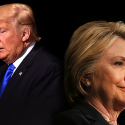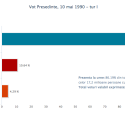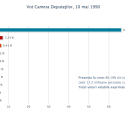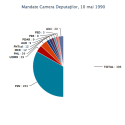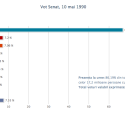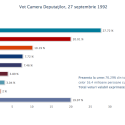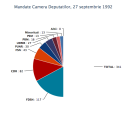IMPORTANT DEVELOPMENTS
- FOREIGN POLICY. Bucharest hosts the China – CEE Economic and Trade Forum
- BUDGET. President Traian Basescu announces he will try to block the 2014 budget.
- ECONOMY. The Government and the National Bank emphasize that the new budget will not affect economic growth negatively.
- ADMINISTRATION. The public debate on decentralization picks up in Romanian media.
- POLLS. The Romanian public supports the actions of the Ponta Cabinet, while the PSD remains the frontrunner for the EP elections.
- POLITICS. The unification of the right-wing forces faces tremendous hardship.
.
1. THE CHINA AND CENTRAL AND EASTERN EUROPE ECONOMIC AND TRADE FORUM IS HELD IN BUCHAREST
Bucharest became one of the most important political venues as the Romanian Prime Minister welcomed the Chinese Prime Minister, Li Keqiang, who came to Romania to attend the third edition of the China and Central and Eastern Europe Economic and Trade Forum. The Forum is widely considered as one of China’s most prominent foreign investment instruments. For the Romanian Government, the visit was a political success. The visit comes after a true foreign policy tour-de-force of Prime Minister Victor Ponta since assuming government in 2012.
Li Keqiang’s visit comes after Ponta’s visits to the USA, France, Germany, Italy, Poland, Spain and Central Asia. The Romanian officials capitalized on an event that can be considered a hallmark in overcoming the political quasi-isolation of the last couple of years.
Victor Ponta took the opportunity to reiterate the Government’s strong support to international investors and the business friendly attitude of the government.
Moreover, the visit was also a political success for Victor Ponta. The first visit abroad of the Chinese PM and the first visit of a Chinese PM to Romania after 19 years allow Victor Ponta to score major political points. The bold praises of the Chinese Prime Minister, who described Romania as an “economic tiger” reinforce Ponta’s public stature and give him credit for restoring his country’s economic fortunes.
The visit also resulted in the announcement, by the Romanian PM of several economic projects that will be started as a result of the Chinese visit.
The Tarnita-Lapusesti hydroelectric power plant, worth approximately 1 billion Euros is the major highlight of these agreements, alongside the perspective of Chinese investments in the completion of the third and fourth reactor of the Cernavoda nuclear power-plant.
The energy investment picture is completed by the announcement of the building of a new coal-based power plant at Rovinari, worth 1 billion Euros, as well as 300-400 million Euros in renewable energies.
In terms of transport, the agreements signal the possibility of building high-speed railways, via public-private partnerships. Romania will also become a European maintenance hub for a major IT company, which will result in the creation of 1200 jobs. Moreover, two Romanian companies were able to access Chinese funds, worth 100 million Euros, in order to set-up IT projects. .
.
2. PRESIDENT TRAIAN BASESCU ANNOUNCES HE WILL TRY TO BLOCK THE DRAFT OF THE 2014 BUDGET
The president declared that he could not approve the draft of the budget submitted by the USL Government to Parliament. Traian Basescu declared that he could not accept the increase of the excises on fuels, given the potential harmful impact these increases can have on the Romanian economy. President Basescu also stated that he would block the budget on grounds of „opportunity”.
President Traian Basescu’s statements led way to a new round of political debates – USL figures promptly replied that any opposition to the current draft of the budget, subjected by the Government to parliamentary approval, equates to blocking the increases of the wages in Education and in healthcare.
If the debate on the budget can be easily considered as an attempt of the President to return to the spotlight of the Romanian political scene, one also has to take into account the institutional facts. The President has no prerogatives whatsoever to follow up on his threats. Moreover, the opportunity grounds the President talks about seem discretionary, in relation to the provisions of the Romanian legislation and the Romanian Constitution, a fact that the USL leaders were quick to point out.
.
3. THE BUDGET WILL NOT AFFECT ECONOMIC GROWTH
Government and USL officials went to great lengths to emphasize that the Government will not raise taxes and that the principle behind the draft of the new budget is that of extending the taxation scope and not of increasing the fiscal burden of well-intended contributors. Government leaders emphasized that the VAT, the flat tax rate will remain at the same level. Moreover, Government figures emphasized that solutions for the reduction of the social healthcare contributions are being sought.
USL political leaders have also emphasized the highlights of the new budget. Long expected increases of the wages of debuting teachers and doctors will be accompanied by an increase of the funds allotted for co-financing European funded projects. State support warranties for private actors, especially for SMEs and support for agricultural producers are meant to support the growth of the Romanian economy. Moreover, the Government is looking for solutions to reduce the social healthcare contributions starting from the second half of 2014, alongside with a reduction of social healthcare contributions.
The Government’s position was supported by statements of National Bank officials, who emphasized that the effect of the new budget on prices or on inflation will be minimal. The prognosis of the National Bank points towards the same conclusions as the most recent analysis of the financial system of Eurostat, which points out that Romania has one of the lowest tax to GDP ratios in the EU. The fiscal burden in Romania is one of the lowest in the EU not because the tax levels are the lowest, but because of the large numbers of contributors that avoid paying their dues.
.
4. DECENTRALISATION–THE ADMINISTRATIVE PROCESS THAT ROMANIA NEEDS
Administrative decentralization is a goal of the entire political class and an important point on the civil society’s agenda. Virtually, all parliamentary political parties, and the most active and influential NGOs in the civic area have supported, over time, the need for administrative decentralization.
Recently, the Government has undertaken the responsibility to the Parliament on the decentralization law, being the first time in the history of Romania, after 1989, when a Prime Minister and a Government will give local authorities new powers, instead of centralizing them. USL representatives reiterated that decentralization is a process that involves, in fact, sharing real power. For example, the central power is now held exclusively by the USL, but there are in the territory mayors and CC presidents who belong to opposition parties.
USL leaders have also stated that decentralization is not just for one election, but also for all the years to come, and the local policy configuration will not always be the same.
In practical terms, the only institution that can block the decentralization law is the Constitutional Court (hereinafter CCR). Notifying the Court and the simple motion are the only instruments, the first institutional, the second political, through which the Democrat Liberals may oppose the Government and this bill. If in case of the motion PDL’s chances are minimal, its stake being actually that of striking an opposition action, regarding the notification of the Constitutional Court, the game is, at least theoretically, open to any result. Virtually the only institution that could block at this time the decentralization law is the CCR.
.
5. THE PONTA CABINET RETAINS A VERY STRONG STANDING IN THE POLLS. THE PSD REMAINS THE FRONTRUNNER FOR THE EP ELECTIONS
Although the Ponta Cabinet has been leading Romania for more than a year and a half, its standing in the polls still holds very strong among the general population. The level of satisfaction Romanian voters have with the Cabinet has only recently faltered slightly, though still at an impressive 46% of the total population of the country. Considering that elections generally yield a turnout no larger than 30-50%, these numbers can be considered quite strong.
Even further, the Romanian population is even fonder of its Prime Minister’s activity than that of the Cabinet or the President. While the PMs figures of public support have also slightly dropped in recent months (mainly due to the now ended Rosia Montana protests), they still hover at the 50% of the total population limit. In comparison, President Basescu is at a much lower level of support, with an apparent glass ceiling of 29% of the total population.
According to an opinion survey conducted between 28 and 31 October 2013, if the elections for the European Parliament would take place next Sunday, 41% of respondents would vote for PSD (Social Democratic Party), 20% for PNL (National Liberal Party), 18% for PDL (Democratic Liberal Party) and 5% for UDMR (Democratic Union of Hungarians in Romania).
Other parties included in the survey are PPDD (People’s Party – Dan Diaconescu) with a 4% voting intention, PRM (Greater Romania Party) – 3%, PMP (Popular Movement Party) – 3%, PC (Conservative Party) – 2%, ADA (Truth and Justice Alliance) – 2% and others – 2%.
The national survey has been conducted by CSCI at the request of the Multimedia Foundation, targeting the non-institutionalized adult population, using the CATI method. The sample was of the multistage cluster type, with probabilistic selection of individuals, and consisted of 1.123 interviews, with a 3% tolerated error limit, at a 95% probability level.
.
6. THE „UNIFICATION” OF THE ROMANIAN RIGHT LACS PERSPECTIVES
Recent discussions about the unification of the right currently have relatively low chances of materializing. Ungureanu’s initiative to form the National Unity Block, through the association of the Civic Force with PNTCD, IRL, People’s Movement Party, PER and PDL, has had different reactions from the the Democrat Liberal leaders. Without the participation of PDL, any such construction would be inconsistent (and without political power). In this respect, Mihai Razvan Ungureanu’s approach to invite Vasile Blaga to the talks was expected. MRU’s stake is both polical and imagological. He makes a win-win game: appears as the initiator and unificator of the right and, at the same time he comples the PDL leader either to reject the proposal, or to go along with it.
The unification of the right wing forces meets three major obstacles: the moment when it should take place, before or after the European Parliament elections, the candidate who will get the support of the new political party in the presidential elections and the animosities between PDL and PMP.
In terms of timing, PDL would like more that this event to happen after the European elections. Thus, PDL will demonstrate its strength in the face of its potential allies, because the score of the Democrat Liberals will certainly be higher, which will give them a distinct advantage in the negotiations for the designation of the „right’s candidate” for the presidential election. On the other hand, FC, IRL, PER and PNŢCD would want this unification to occur before the European Parliament elections, since the Alliance will have common candidates. However, even within the PDL there are differences of views: Gheorghe Falcă, close to President Basescu, is a proponent of the idea that the right has to be united before the spring elections, while Cătălin Predoiu and other party leaders prefer the version in which the Democrat Liberals candidate themselves. In addition, in this case, the PDL is split into two camps: the Blaga camp and the Udrea-Basescu camp. There is however a common view that all PDL members share: the right has to unite around PDL.
Thus, the unification of the right very much depends on the PDL. Without PDL and PNL we cannot talk about a united right in Romania. Without PDL, PNL cannot talk about a united right-wing force in Romania. As long as the PNL remains within USL, the only possible option remains PDL, which is still the best organized right party right, outside of the Government. Given that within the PDL opinions are divided mainly between the Blaga wing and the supporters of President Traian Basescu, such an event does not seem to take place soon.


